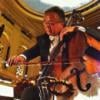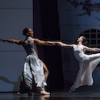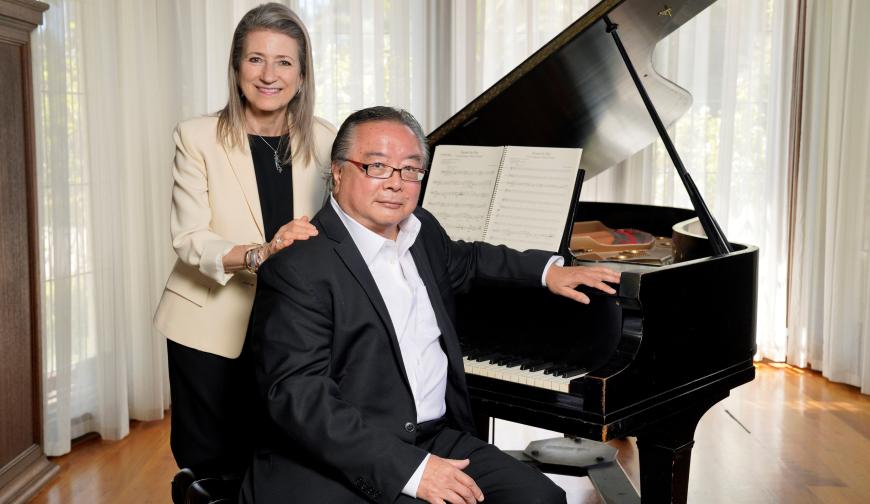
Composer/teacher/bass player Shinji Eshima and Patricia Kristof Moy, executive director of Music at Kohl Mansion, have been at the center of the San Francisco Bay Area’s musical life for decades. In fact, adding up their years of service equals San Francisco Opera’s century.
And, as if to demonstrate their omnipresence, mentioning the Opera has this further relevance: Eshima has been a double bassist in the SF Opera Orchestra since 1980 (and associate principal bass in the SF Ballet Orchestra); Moy has been the Opera’s French coach for the past 42 years, currently in the news because of her work with the new production of Dialogues of the Carmelites. Both had been prominent in the city’s musical life for a decade before.
And now, Eshima and Moy are collaborating on the highlight of Music at Kohl Mansion’s 40th-anniversary concert on Nov. 13 — the world premiere of Eshima’s commissioned quintet, Hymn for Her.
The concert’s program also includes excerpts from two other Kohl Mansion-commissioned works, Ernst Bacon’s Piano Trio No. 2 (1987) and David Carlson’s Sonata for Cello and Piano (1993), as well as Felix Mendelssohn’s Piano Trio No. 1 in D Minor, Op. 49.
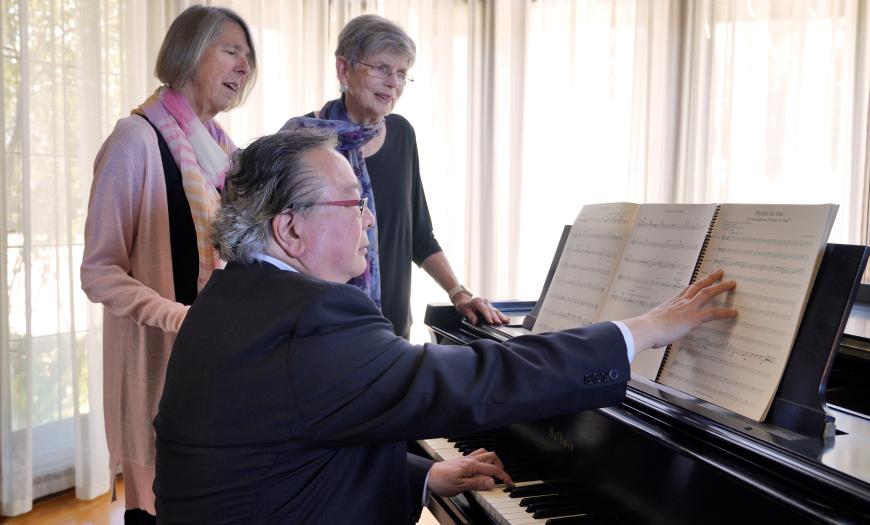
About Moy and the work for Music at Kohl Mansion, Eshima says: “Interconnected is the word that comes to mind as I reflect on how my life as a bassist and teacher, and more recently as a composer, possibly led to this commission for Music at Kohl. When Patricia left a message for me to contact her, I assumed it was perhaps to play on a program there. I had no idea it was to ask if I would compose a new work for them, let alone for the prestigious occasion of their 40th anniversary.”
For a small chamber-music venue, it’s rare to have four commissions. The first three were from composers Ernest Bacon, David Carlson, and Jake Heggie. “I was intimidated by the offer at first,” says Eshima, “following in such footsteps, but Patricia persisted and next sent me a copy of the book by Liz Dossa, Notable Excitement, about Music at Kohl.
“Upon reading this book I came to realize what a remarkable institution Music at Kohl truly is. The sheer will and forceful determination of founders Amy Bayley, RSM (affectionately known as Sister Amy) and Liz Dossa is an inspiring story.
“Despite a major earthquake and severe economic downturns, they have created and managed to sustain a true local treasure, not just for the excellent performances but for their educational outreach and master-class programs. We are all in their debt. My piece, a quintet playfully titled Hymn for Her, is dedicated to them.”
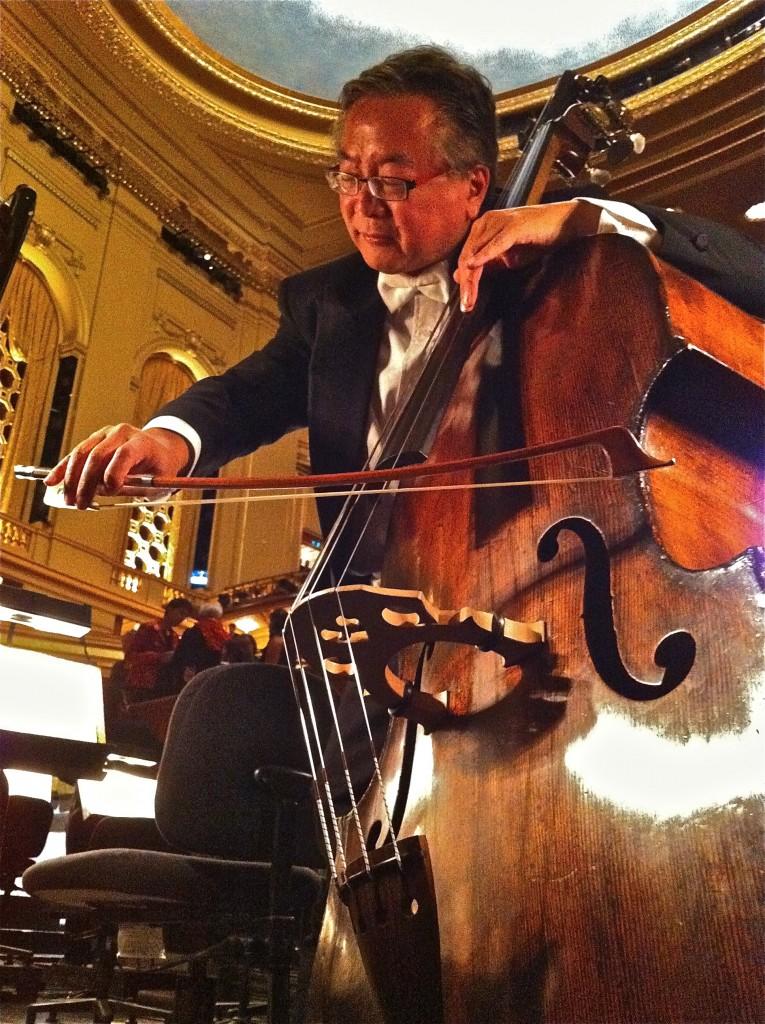
Eshima, 66, was born in Berkeley to Japanese American parents. Starting on the piano, at age 9, he won a prize at the Junior Bach Festival and took up the bass later, self-taught and encouraged by violinist Anne Crowden, founder of the famed music school in Berkeley.
Eshima played in the Berkeley Youth Orchestra and the Oakland Symphony Youth Orchestra between 1972 and 1974; the latter group, led by Denis de Coteau, performed on tour in Berlin. Eshima graduated with a Bachelor of Arts in Music from Stanford University in 1978 and from The Juilliard School with a Master of Music the next year.
Eshima has long worked with the performers for the Nov. 13 program, except for Shaleah Feinstein, a last-minute substitute. These connections are the warp and woof of the career of an important local musician whose work deserves celebration.
Feinstein, it should be noted, is the daughter of SF Opera concertmaster Kay Stern, and she trained early on at the SF Conservatory of Music and in the SF Symphony Youth Orchestra. She is now a substitute member of the Metropolitan Opera Orchestra.
In addition to Feinstein, the musicians for the 40th-anniversary concert are pianist Karen Hutchinson, cellist Emil Miland, clarinetist Jose Granero, bassist Charles Chandler, and marimba soloist Haruka Fujii.
Eshima says of the musicians: “Karen Hutchinson is one of the Kohl founders. Years ago she beautifully performed in a trio of mine. Always beloved cellist Emil Miland is the only musician to perform all of the previous three [Music at Kohl] commissions. I credit Emil with encouraging me to become a composer.
“I have known him since high school, where I played behind him in YPSO [the Young People’s Symphony Orchestra in Berkeley], and 42 years later I still play behind him in the SF Opera Orchestra. In fact, the trio he initially asked me to compose for him became The Despot’s Rage, the Slave’s Revenge, for marimba, cello, and piano.”
Moy also recalls that marimba trio: “In January 2014, we presented it on the Kohl stage, the Bay Area premiere of the trio composed in 2003 by Shinji for Emil Miland. It was a natural for me to reach out to Shinji when contemplating a composer with a long local history to write a piece for Music at Kohl’s 40th-anniversary celebration.”
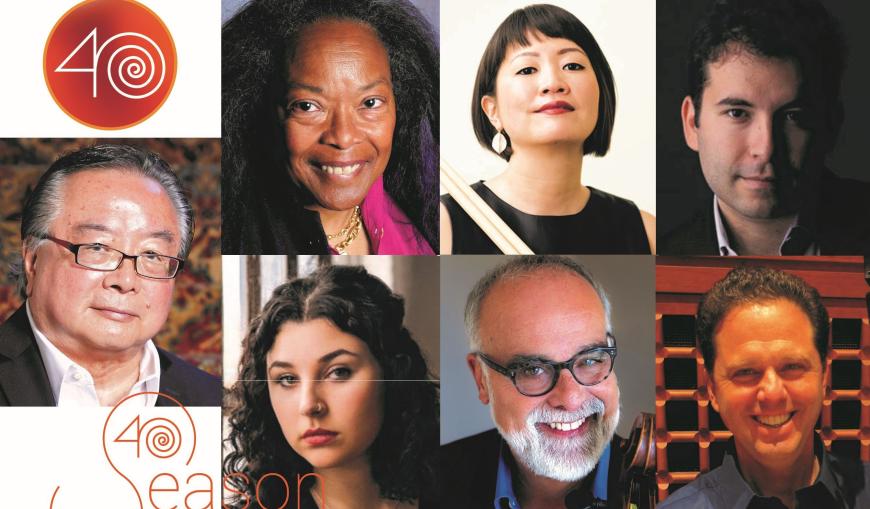
Of the Eshima-Miland connection, the composer says: “A current project of mine is an opera based on the life of the late, beloved mezzo-soprano Zheng Cao. She was a personal friend and especially close to Emil. I wrote a solo cello accompaniment to the wedding scene in the opera just for Emil.”
Jose Granero is principal clarinet in the SF Opera Orchestra. Eshima says of him, “He is one of the most musically expressive artists I have ever heard. He recorded my RAkU as a member at the time with SF Ballet Orchestra, in Skywalker recording studio. He premiered my solo clarinet piece Chesed, written for him. He is also a brilliant composer.”
Marimba soloist Haruka Fujii is a member of the Silkroad Ensemble and recently performed in a trio Eshima composed for her called Musubi (Hawaii’s seaweed, rice, and Spam combination dish, similar to the Japanese onigiri).
Fujii’s mother, Mutsuko, is a pioneer of the Japanese marimba movement that started in the late 1960s. The marimba is a beloved instrument in Japan, with roots there before it became a popular instrument elsewhere. Eshima muses, “I sometimes wonder if it is genetic memory that is the source of my love for this instrument.”
Eshima credits this “interconnectedness” as the catalyst for his composing career:
As a teacher I have served on the faculties at the SF Conservatory of Music, SF State University, Stanford University, and UC Santa Cruz, as well as SF School of the Arts. About five years ago, I retired from teaching to devote more time to composition.
As a composer, I have been fortunate to have been commissioned by SF Ballet for two ballets for full orchestra choreographed by Yuri Possokhov. RAkU premiered in 2011 and Swimmer in 2015. The audio recording of Swimmer will be released soon.
As an example of being ‘interconnected,’ at the time I composed RAkU, I was teaching at the SF Conservatory of Music. I had this idea of incorporating a Buddhist chant into the score because the story of the ballet included a Buddhist monk. I had an adult student at SFCM, Paul Grantham, who inquired during a bass lesson how my score was proceeding. I told him of my idea to ask the orchestra musicians to ‘chant’ through their instruments. He asked me if I could use a group of Buddhist monks to perform a real chant. I thought he was kidding.
Unbeknownst to me, Paul was a member of the board at San Francisco Zen Center. At the first orchestra rehearsal of RAkU, a group of Zen monks arrived. When I told them I had no music nor text for them, they replied they already had the ‘Enmei Jukku Kannon Gyo’ memorized. They chant this often. This chant became central to the score, and whenever this ballet is performed, these monks organize and teach the local chapter of the Zen Center to show up and chant in the pit with the orchestra.
In 2015, I was commissioned by Michèle and Larry Corash to compose a piece for cellist Amos Yang and bassist Charles Chandler of the SF Symphony. As it turns out, Charles was my very first bass student. I was thrilled to try to compose for him. The Corashes are major supporters of the SF Symphony. Their contributions to the world are too numerous to list here.
The resulting composition was Bariolage for cello and double bass. When the Corashes heard it, they thought of it as a ballet. A recording was sent by my wife to her dear friend and colleague, famed dancer Jacques d’Amboise. He immediately agreed that it should be a ballet. It has since been successfully presented by Carolina Ballet, Festival Ballet Providence, and Catharine Clark’s BOXBLUR here in San Francisco.”
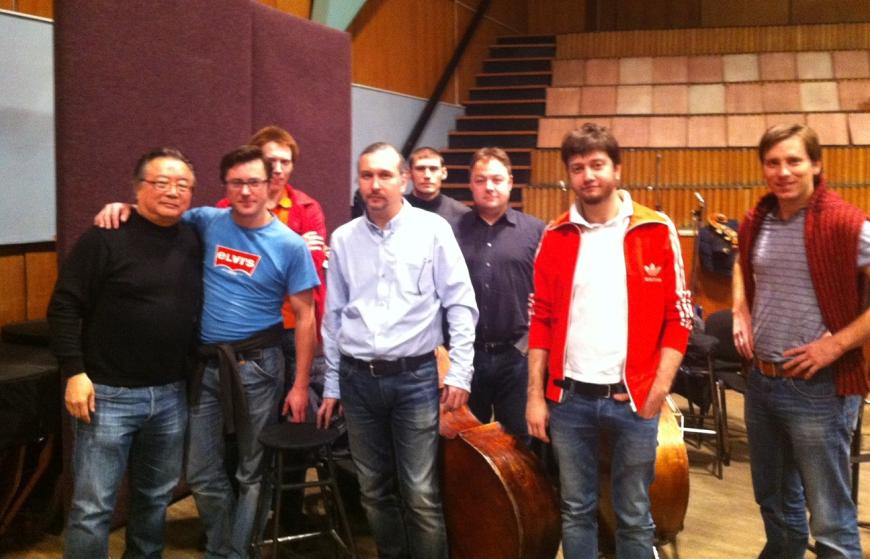
Among Eshima’s many musical adventures is a virtually unprecedented honor in Russia — well, before Putin’s murderous outrage that ended all cultural exchange.
I hosted a recital for Artem Chirkov, principal bass of the St. Petersburg Philharmonic, here at SF State University. He is among the best bassists I’ve ever heard. This occurred after we hosted the International Society of Bassists’ conference at SF State, attended by 1,100 bassists. (I still can’t believe that.)
I had visited St, Petersburg and met Chirkov about a year earlier. We became fast friends. I met many lovely people there, including Dmitry Ermakov, a close friend of conductor Nikolay Vinokurov.
When I visited Moscow I was invited to give a bass class at the Gnessin Russian Academy of Music by my new friend, conductor Nikolay Vinokurov. It came as a total surprise. I think in retrospect, if I had known before that I had to give this class, I never would have. But once there, the opportunity for an exchange was not something I could refuse. It was a wonderful and rewarding experience.
If only we could have more such exchanges. War would become inconceivable with such talented, welcoming, musically sensitive, and richly cultured people. The world scenario now is simply heartbreaking. I wish music could help solve these huge problems.”
Later programs for Music at Kohl Mansion’s 40th season include the Miró Quartet (Dec. 4), Scotland’s Maxwell Quartet (Jan. 22, 2023), Trio con Brio Copenhagen (Feb. 5, 2023), Berlin’s Fauré Quartett with mezzo-soprano Frederica von Stade (March 12, 2023), Curtis on Tour with Ida Kavafian and Peter Wiley (April 16, 2023), and the Alexander String Quartet (May 7, 2023). All performances start at 7 p.m. To purchase single tickets or a season subscription, visit the Music at Kohl website.



